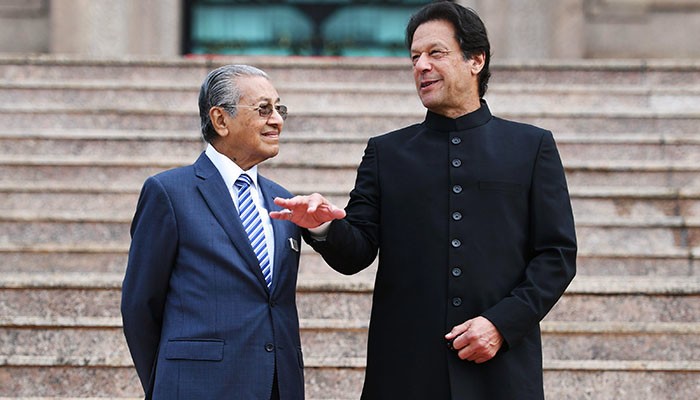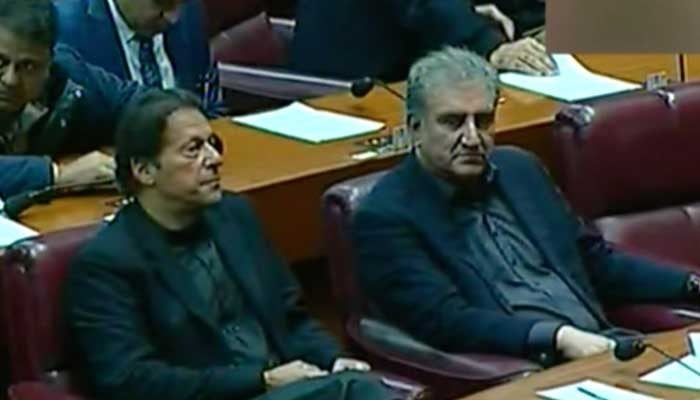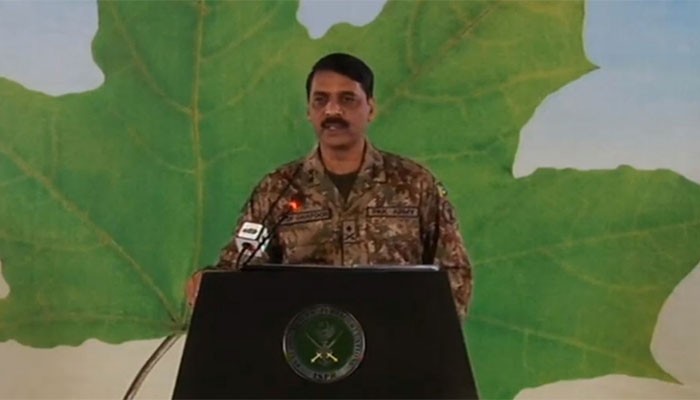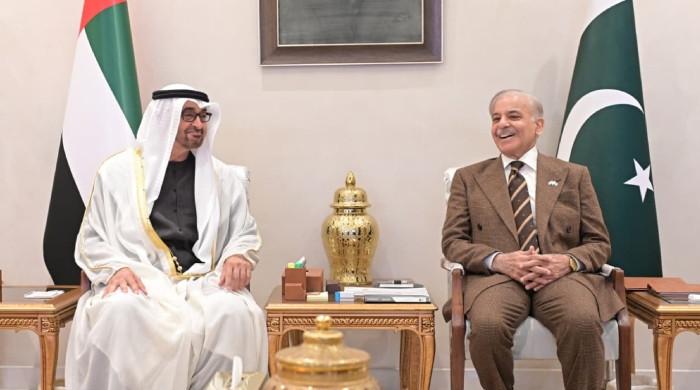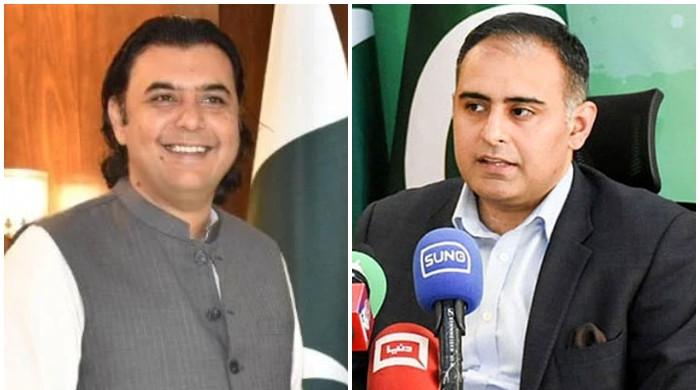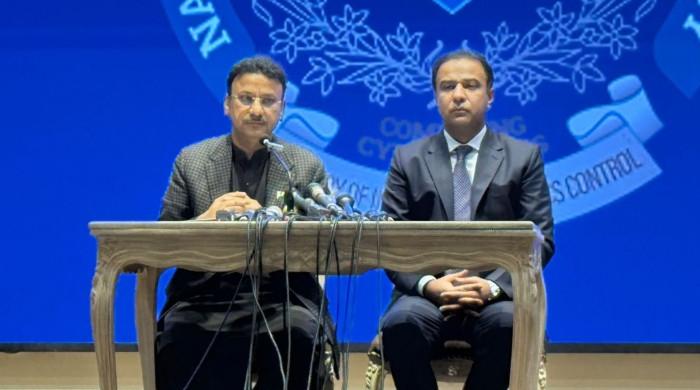Thrust of Pakistan's foreign policy is to keep external wars out, says Moeed Yusuf
Special Assistant to PM on National Security says Pakistan developing coherent national security policy
January 13, 2020
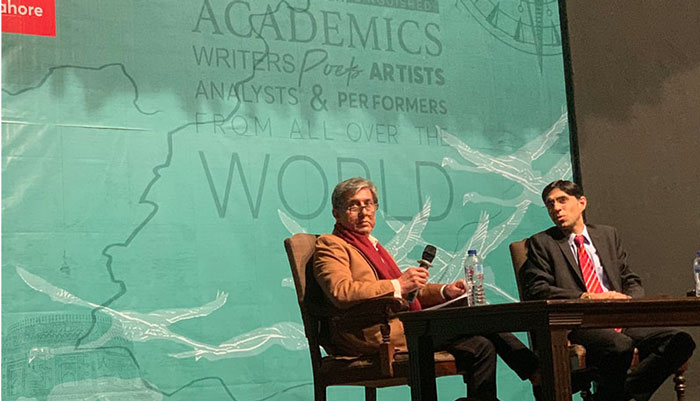
LAHORE: Special Assistant to Prime Minister on National Security Division and Strategic Policy Planning Moeed Yusuf said on Sunday that the thrust of Pakistani foreign policy at the moment was concentrating on keeping external wars out of the country, reported The News.
Yusuf made the remarks while speaking at a session discussing national security on the second day of the Think Fest 2020 held at the Alhamra Hall in Lahore. Journalist and defence expert Ijaz Haider moderated the conversation with Yusuf at the session.
“At the moment, Pakistan’s engagements in the region aim to convince rival countries to de-escalate, and Foreign Minister Shah Mehmood Qureshi’s current tour of Iran, Saudi Arabia and US is a step in that direction,” Moeed Yusuf said during the session.
Also read: PM Imran appoints Dr Moeed Yusuf as Special Assistant on National Security
According to the special assistant, Pakistan was the only country in the Muslim world at the moment that can talk to every country. “Pakistan knows mediation will not bear fruit in this situation, but it’s time to engage in diplomacy to prevent escalation,” he noted.
Commenting on the criticism that the government had faced from certain sections of the media in light of the efforts to mediate Mideast peace, Yusuf maintained what might have looked like bad optics to the press was actually in the national interest of Pakistan.
“Had we been doing it for optics, we would not have engaged Taliban, as the international media was bashing Pakistan for being allied with them (Taliban),” Moeed outlined, adding that if Pakistan used the avenues available to it for peace in the region, then optics did not matter.
Also read: Iran conflict: US sought Pakistan's help, says Dr Moeed Yusuf
'Received dignified response to KL summit pullout'
In response to questions about Pakistan pulling out of the Kuala Lumpur summit to address concerns of major countries regarding the gathering, Yusuf said that the decision to pull out from the summit was a conscious choice and might have been bad optics, but Pakistan handled it well.
“Even if there’s 5 per cent probability of success, Pakistan is going for it,” he said in reference to the efforts of PM Imran to mediate between Iran and Saudi Arabia. PM Imran had traveled to Saudi Arabia last year in a bid to ease Saudi concerns before pulling out of the KL summit.
"Saudi Arabia was apprehensive about a parallel organisation being formed to replace the Organisation of Islamic Cooperation (OIC)," Yusuf informed the audience, adding that the response Pakistan received from Malaysia and Turkey after pulling out of KL summit had been dignified.
"The response of Malaysia’s Prime Minister Mahathir Mohamad and Turkey’s President Tayyip Erdogan was favourable and dignified despite Pakistan pulling out of KL Summit," Yusuf said, adding that Pakistan was in constant touch with Turkey and Malaysia.
"Prime Minister Imran Khan is going to Malaysia next month, and Saudi Arabia is still in our camp. Where’s the failure? It may give bad optics, but it’s not a failure,” he said in a satirical manner, apparently referencing the severe criticism the PM had faced in the aftermath of the Saudi trip.
He said Turkey and Malaysia had supported Pakistan on Kashmir and Financial Action Task Force (FATF), and Pakistan had its interests with other countries, including Saudi Arabia, too. “We have to be cognizant of our national interests,” he was quoted as saying by The News.
Also read: Unfortunate if opposition decides to approach SC over ECP, says Fawad
'Developing coherent national security policy'
Outlining the policy reforms that the government was considering that were related to national security, Yusuf said that a new, more coherent national security policy was being developed that would integrate foreign and economic policies with other sectors.
"We are developing a coherent national security policy, which integrates foreign policy, internal security, education, population, global warming, culture and tourism, with a sole aim to ensure the social and economic security of the common man," he said.
“It will be out by the end of this year,” he underlined, and added that Pakistan was breaking away from the traditional definition of single-track geo-economic policy, and now integrating all sectors to work in tandem to achieve the goal of uplifting the common man.
Also read: Can the Iranian army confront the might of the American military?
“It’s a paradigm shift. It’s not going to happen overnight, but finally, it will be out by the end of 2020,” he said, adding that, "For 70 years, we have been functioning under short-term strategies. Our job is not to tell what will happen tomorrow, but what will happen day after tomorrow."
'Pakistan raising voice for occupied Kashmir'
Talking about the Indian brutalities in occupied Kashmir, Yusuf maintained that the absence of all out open resistance from Pakistan to the Indian actions in occupied Kashmir were not a failure, but rather, Pakistan had adopted a different strategy to challenge India.
"The absence of all out open resistance is not a failure. Our approach is diplomatic. Pakistan has also approached the United Nations, knowing that it can’t resolve the issue, but because the UN ensures Kashmir’s status as a legal dispute," he reportedly said.
"Pakistan is also very effectively raising the issue of Indian-Occupied Jammu and Kashmir through all diplomatic channels available to shake the conscience of the world community to provide justice to the oppressed people of the held valley."
Originally published in The News
